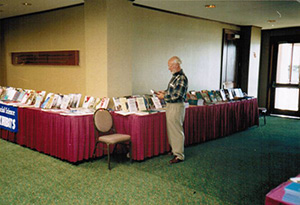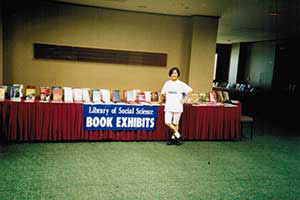|
||||
| This is the second in a series of Newsletters on the history of Library of Social Science. To read the first installment, please click here. |
||||
Denis Snook, the conference organizer, persuaded several publishers to participate in the exhibit. For four days, we existed within a cozy little space, meeting and greeting attendees. Denis continually walked around the space, checking things out. He frequently observed Mei Ha and me rapping with conferees and writing up orders—having a good time. He never spoke a single word—just watched. Finally, after three or four days, we packed up and were about to depart. I saw Snook, walked up him, shook his hand, and said, "Thanks so much for being so courteous." He was bemused: "Why are you thanking me? I didn't say a word to you throughout the entire conference." Then he reflected, "Ah, I guess letting someone do their own thing is the greatest form of courtesy." This statement became mythical for me—setting the stage for everything that followed. After the meeting, Denis and I began a dialogue continuing for several years. The ideas we developed established the foundation for Library of Social Science Book Exhibits (although I barely had a clue that I was starting a "company"). Denis, a veteran of the Vietnam War, didn't feel good about having participated. His devotion to the field of political psychology was a way of "making amends." Beginning in 1981 (until 1992), he was conference organizer for every single ISPP meeting. He received a pension from the US government—who thus supported his efforts to establish this new field. Most of Snook's time during each year revolved around planning and organizing the ISPP conference. Having witnessed my performance in 1988, he asked me to take over running the book exhibit. I consented to organize the exhibit for the 1990 ISPP meeting at the Mayflower Hotel in Washington, DC. I created a sales letter and mailed it to perhaps 100 publishers, who had to mail the reservation form back, since in those days there was no email—and I didn't have a fax. I signed up 70 publishers to participate, a record that stands to this very day. The book exhibit itself was a huge success—they had to substitute an entire ballroom for the modestly sized room that had been planned for the display. In subsequent conversations, Denis related his philosophy governing the ISPP book exhibit. He wanted to "carve out a niche for the field;" to develop an "ongoing conversation among scholars." He saw book exhibits as a service to members of the organization who wanted to know about the "latest and most significant developments in the field." He aspired to provide attendees with a "comprehensive picture of the state of the art in the field of political psychology." So there at the beginning was the philosophy that has guided LSS Book Exhibits: providing a display that conveys the State of the Art in a given discipline. In our heart, the dream remains the same. I organized another successful book exhibit for ISPP in 1992 (in San Francisco). By bringing so many titles together for a field that heretofore had been obscure—political psychology was becoming a genuine discipline. Indeed, by 1992, ISPP had hired their first Executive Director, George E. Marcus of Williams College. Soon, the ISPP no longer needed Denis Snook. As is the wont for academic organizations, Snook was honored with the "Jeanne Knutson award" at the 1995 ISPP meeting. As LSS Book Exhibits evolved in the Nineties, I frequently presented papers or participated in panels at meetings where we created book exhibits. What was my thinking? Did I create the book exhibit business in order to finance my desire to present ideas at conferences? Or—since I was organizing a book exhibit at a particular meeting, did I say to myself—"Gee, since I'm attending the meeting as an exhibitor, I might as well present a paper?" From my perspective, the business and scholarly dimensions of Library of Social Science are not separate. Library of Social Science creates book exhibits of unsurpassed quality. Our exhibits are a sight to behold. Conference attendees are not only impressed, but often stunned by the quality of our displays. The well-known political psychologist Jerrold M. Post conveyed the experience of a Library of Social Science vividly. I greeted him as he entered the hotel ballroom where the ISPP exhibit was located in 1992. The room was brightly lit with 14 tables containing over 300 books. Jerry's gazed around the room, was astonished, and expressed his appreciation: "Holy shit!" |

